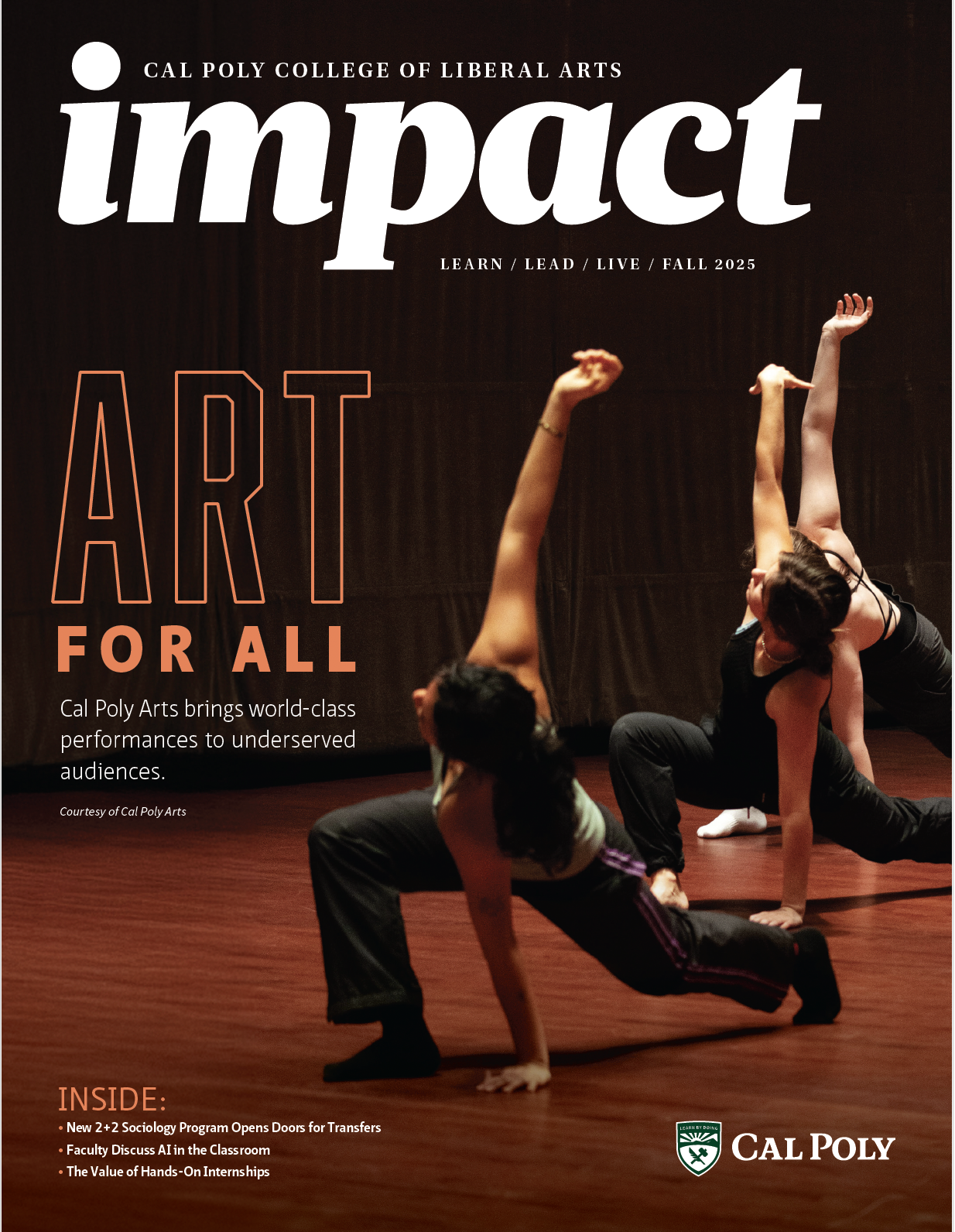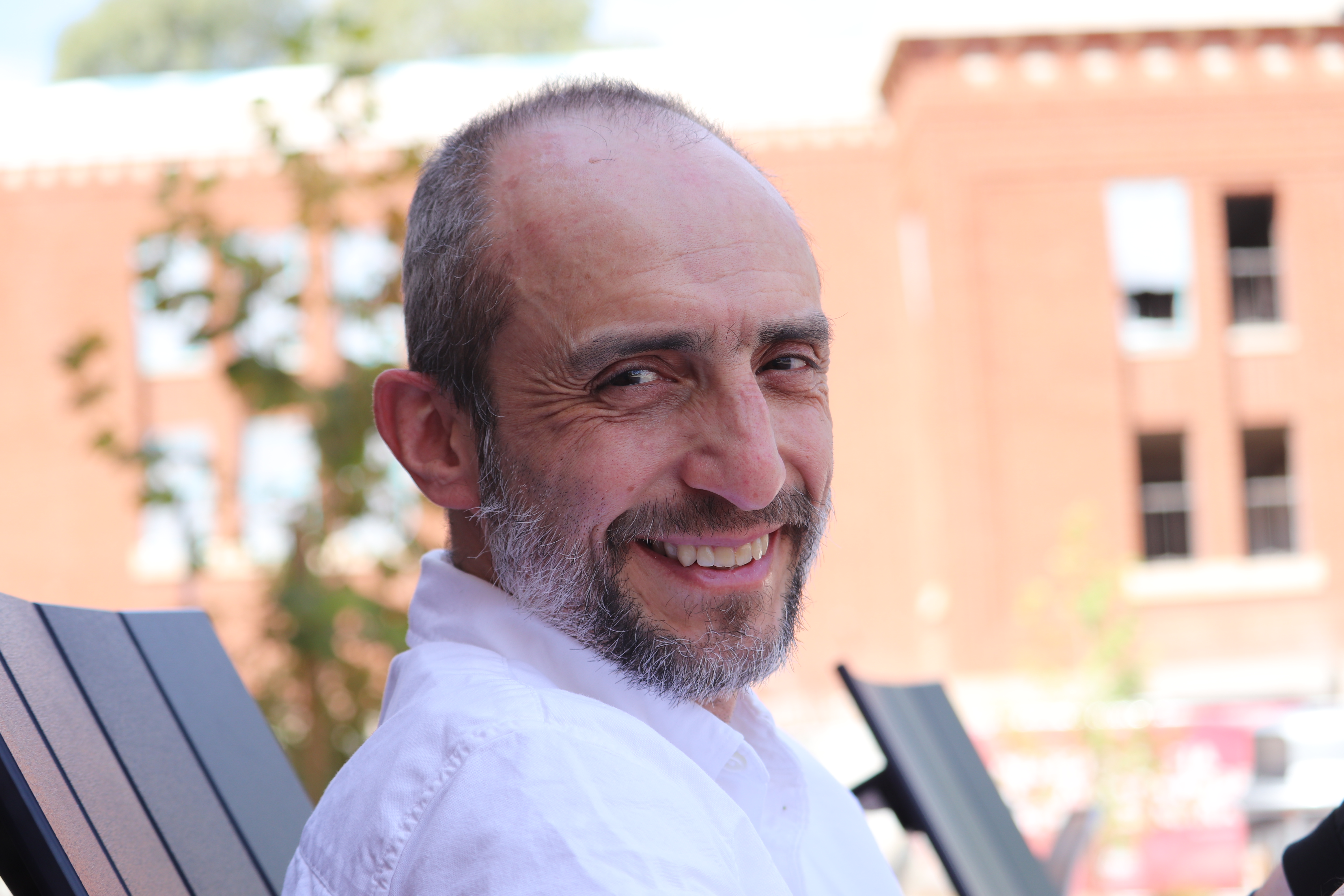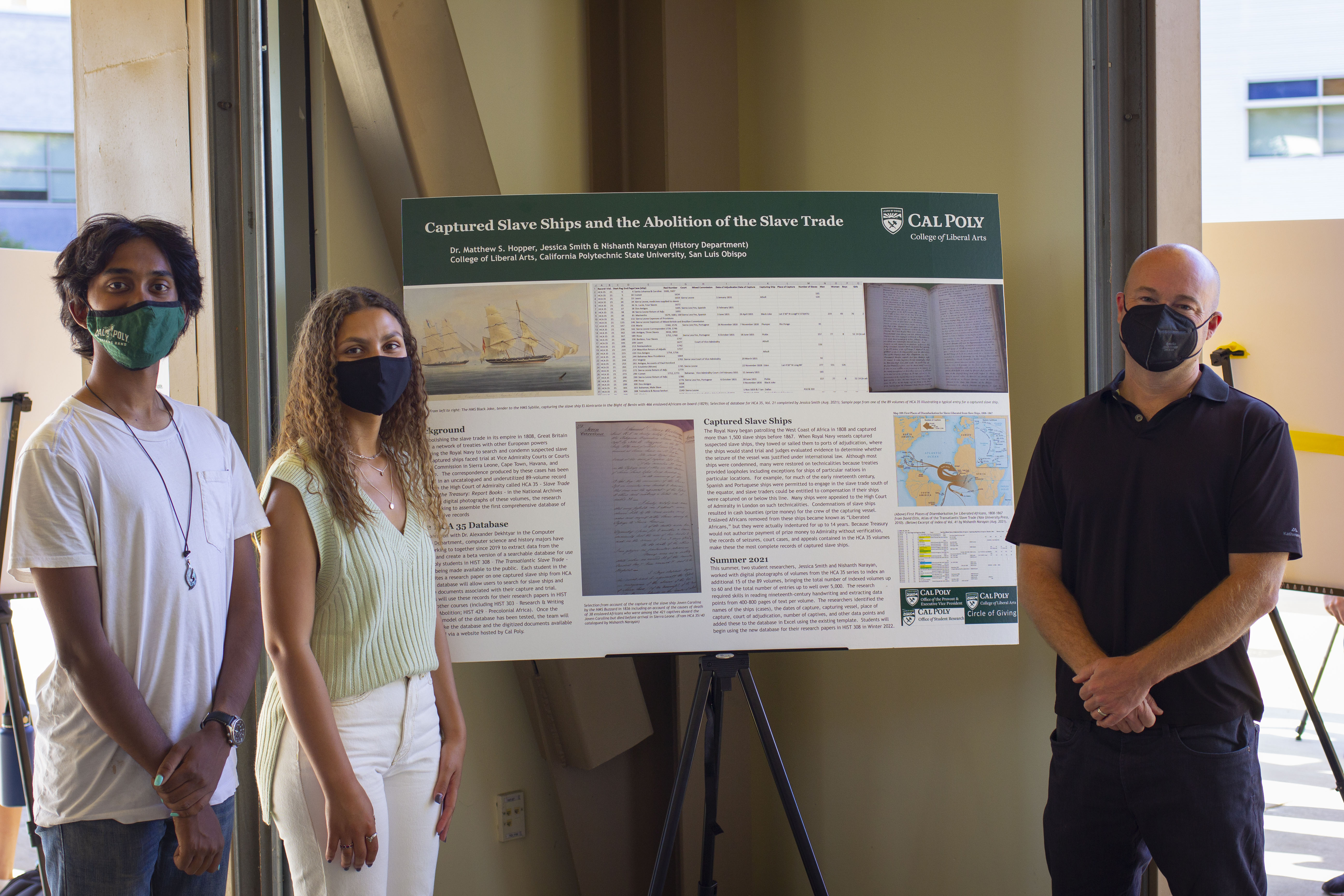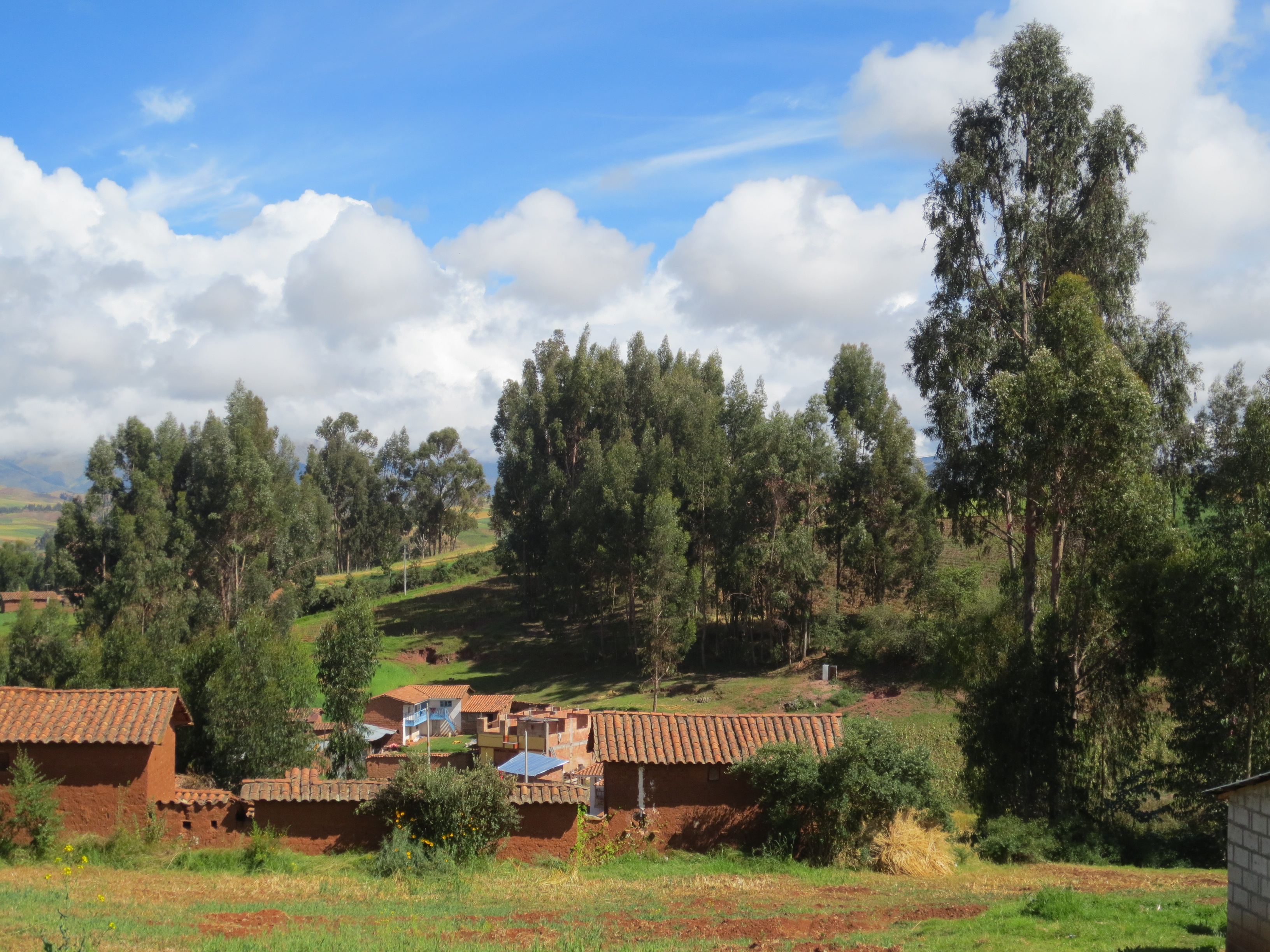Liberal Arts Summer Undergraduate Research Program Launches
A new program supports hands-on student research opportunities across a range of disciplines.
Rebecca Harding (Anthropology and Geography, ’19) helped faculty with preliminary field research in 2019 on the impact of pine plantations in Peru. Despite their canceled 2020 travel, social sciences faculty utilized SURP to continue engaging students with the project.
The College of Liberal Arts held its first Summer Undergraduate Research Program (SURP) in the summer of 2021 with funding from the Office of Student Research; Cal Poly Provost’s Office; and the Circle of Giving donors, who focus on faculty and student research opportunities. Eight faculty-led research projects allowed 10 students to learn more advanced research techniques in a hands-on setting while building mentor relationships. Student researchers received $3,500 stipends, allowing them to fully immerse themselves in the process and increasing the overall accessibility to hands-on research and industry connections.
When anthropology and interdisciplinary studies Professor Dawn Neill, director of research engagement and internationalization, began developing the program for CLA, she used other Cal Poly colleges’ successful programs as a model. However, special care was taken to intentionally include a broader range of disciplines.
“The word ‘research’ may sound limiting, but in the College of Liberal Arts, we see scholarly engagement as encompassing the breadth of disciplines in our college: everything from hard science or social science, all the way to visual and performing arts,” Neill said. "All of these things are considered scholarship as relevant to participants’ interest and disciplinary areas. This is a fully inclusive program.”
CLA had originally planned to launch SURP in the summer of 2022. However, funding unexpectedly became available, so plans were accelerated to launch a year early. Despite the many reasons why interest among faculty and students was lower than a typical year, applications still outnumbered available funding 3.5 to 1, showing a strong demand for more broadly available undergraduate research opportunities.
SURP was specifically designed to support new research projects, as opposed to continued scholarship, so that students without much previous research experience were more likely to be accepted to the program. As part of their application, students shared a personal narrative including their background, experience (whether formal or informal) and how participating in SURP would contribute to their overall academic success. The College of Liberal Arts used this information to build an environment of inclusivity by making accommodations based on students’ unique backgrounds and challenges. Students were considered based on their less traditional experience and ability to share unique perspectives, along with any relevant research experience.
SURP’s hands-on Learn by Doing opportunities accelerate students’ growth and development, providing them with valuable faculty mentor relationships. Meanwhile, faculty benefit by connecting students with their passions. Neill shared her perspective: “It’s fair to say that faculty walk into SURP with eyes wide open, knowing that working with an undergraduate student requires adjusting how they work. However, many of us came to Cal Poly because we enjoy working directly with students and recognize the wider set of benefits. You’ll still get findings, but you’ll also see a fire lit in a student who will engage in the world differently than if they didn’t have that experience. Working in a lab with an undergrad who is already trained in lab methods doesn’t have the same impact.”
In 2022, SURP will likely see even higher demand as faculty and students returning to campus increase productivity closer to pre-pandemic engagement levels. CLA would like to expand the program with additional funding for ongoing projects so that long-term faculty-student collaborations sparked by SURP projects can continue, with a hope to support 30 to 40 projects.
The purpose and mission of CLA's SURP initiative are to:
- Promote diverse and equitable engagement for CLA students in faculty-led research and creative activities
- Enhance faculty participation in scholarship
- Build lasting student-faculty mentoring relationships
- Enrich a culture of scholarship in the CLA
For further details, visit surp.calpoly.edu/cla.
Learn More About CLA's 2021 SURP Projects
TikTok Videos are a Stimulus Set for Generalizable Experiments
Student researcher Kunhua Cheng and Associate Professor
Kelly Bennion present their findings.
Psychology and child development Associate Professor Kelly Bennion; SURP student researcher Kunhua Cheng; and two additional students, Taylor Eng and Hector Reyes, studied the effects of TikTok videos on subjects’ mood and desire for social reinforcement.
Bennion said: “Working with my SURP student, Kunhua, has been incredible. She has contributed to it in ways that faculty likely couldn’t because we don’t know much about the TikTok platform, nor social media in general. She’s made a number of suggestions to the experimental design that we’ve adopted, and the project is truly better being able to collaborate with her than if we had decided everything on our own. She has been absolutely invaluable to the project from the beginning!”
Josè Vasconcelos, Chicanx Philosophy and Lugones’ Logic of Curdling Philosophy
Student researcher Luca Simplicio
Professor Francisco Fernflores and student researcher Luca Simplicio analyzed the writings of Mexican philosopher José Vasconcelos to determine how Vasconcelos’ work relates to a feminist-supporting, humanist, anti-racist, pragmatic philosophy.
Philosophy Professor Francisco Fernflores
Beauty and the Nation: Race, Capitalism and Modernity in Vietnam, 1920-1945
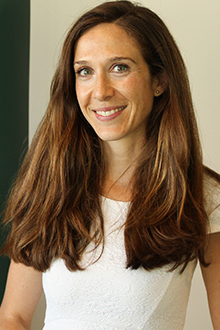
History Professor Christina Firpo
History Professor Christina Firpo and student researcher Téa Tran investigated how French beauty standards and fashion impacted women in French-colonized Viet- nam from 1920 to 1945 and how debate around women’s faces and bodies reflected the greater debate about modern Vietnamese identity.
Firpo said: “I hope to provide my student researcher with intense tutoring in research methods and professional advice. They will leave this project as a resourceful researcher and skilled writer, equipped with the tools of professionalism. I will give them inside guidance on the conference and publishing processes and identify university resources that will be useful throughout their under- graduate career. My hope is to maintain a lasting mentoring relationship with my student research partner.”
Captured Slave Ships and the Abolition of the Slave Trade
History Professor Matthew Hopper and student
researchers Nishanth Narayan and Jessica Smith
History Professor Matthew Hopper and student researchers Nishanth Narayan and Jessica Smith worked to create the first comprehensive database of illegal slave ships captured by the British Royal Navy between 1808 and 1897.
Who’s in Control? Pandemic-Related Impacts on Locus of Control
Social sciences Professor Stacey Rucas and student researcher Sophie Klitgaard studied the effects of coronavirus vaccines, past COVID-19 infections and decreased face-to-face socializing on students’ internal versus external locus of control.
Rucas said: “Many students began reporting at the beginning of the pandemic a sense of loss of control over events in their lives related to everything from classes to housing to economics and rites of passage. This led to questions about how the pandemic might be impacting the psychological orientation of locus of control, especially as extreme externality on this trait is nearly universally associated with negative life outcomes. The opportunity for mentoring students interested in learning how to conduct original scientific research formed the basis for the plan and process
of work.”

Social sciences Professor Stacey Rucas
Students present their research findings at the CLA SURP Symposium.
An Experimental Study of Racial Discrimination in Housing Perceptions

Digital art differentiated between “Black-owned” and “white-owned” homes.
Psychology and child development Assistant Professor Amber Williams and student researcher Yazmeen Norwood studied the effects of housing discrimination against Black homeowners through the subjects’ assessment of a home’s worth based on ownership by a Black or white family.
Williams said: “The ability to work on a research project from the ground up and be an important part of collecting and analyzing data is especially valuable for students wanting to go into doctorate programs. While they take research methods classes, working on a fully formed research project and going through the process of getting funding, setting up preregistration, setting up surveys, developing materials, and of course, writing up the results is an entirely different experience.”
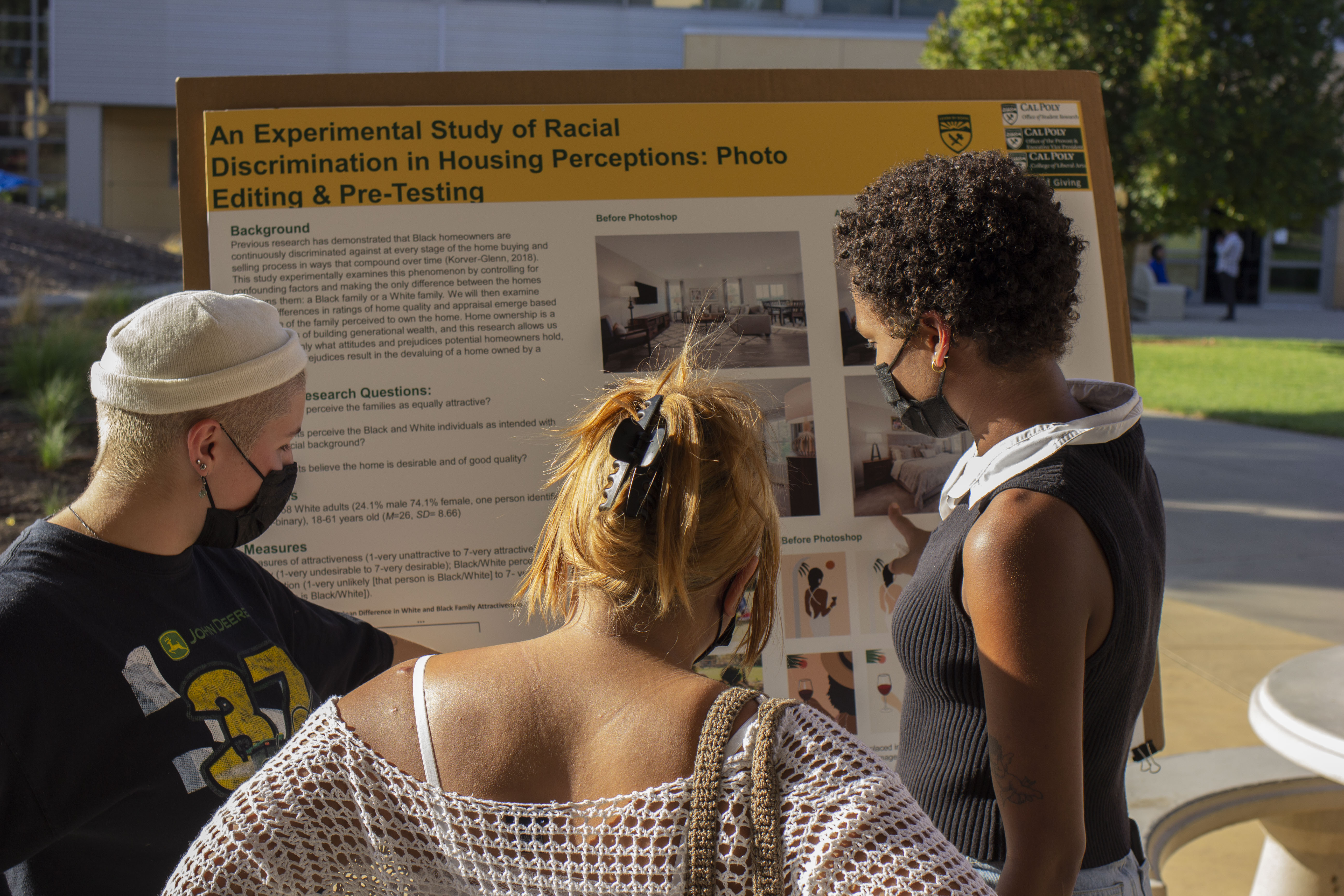
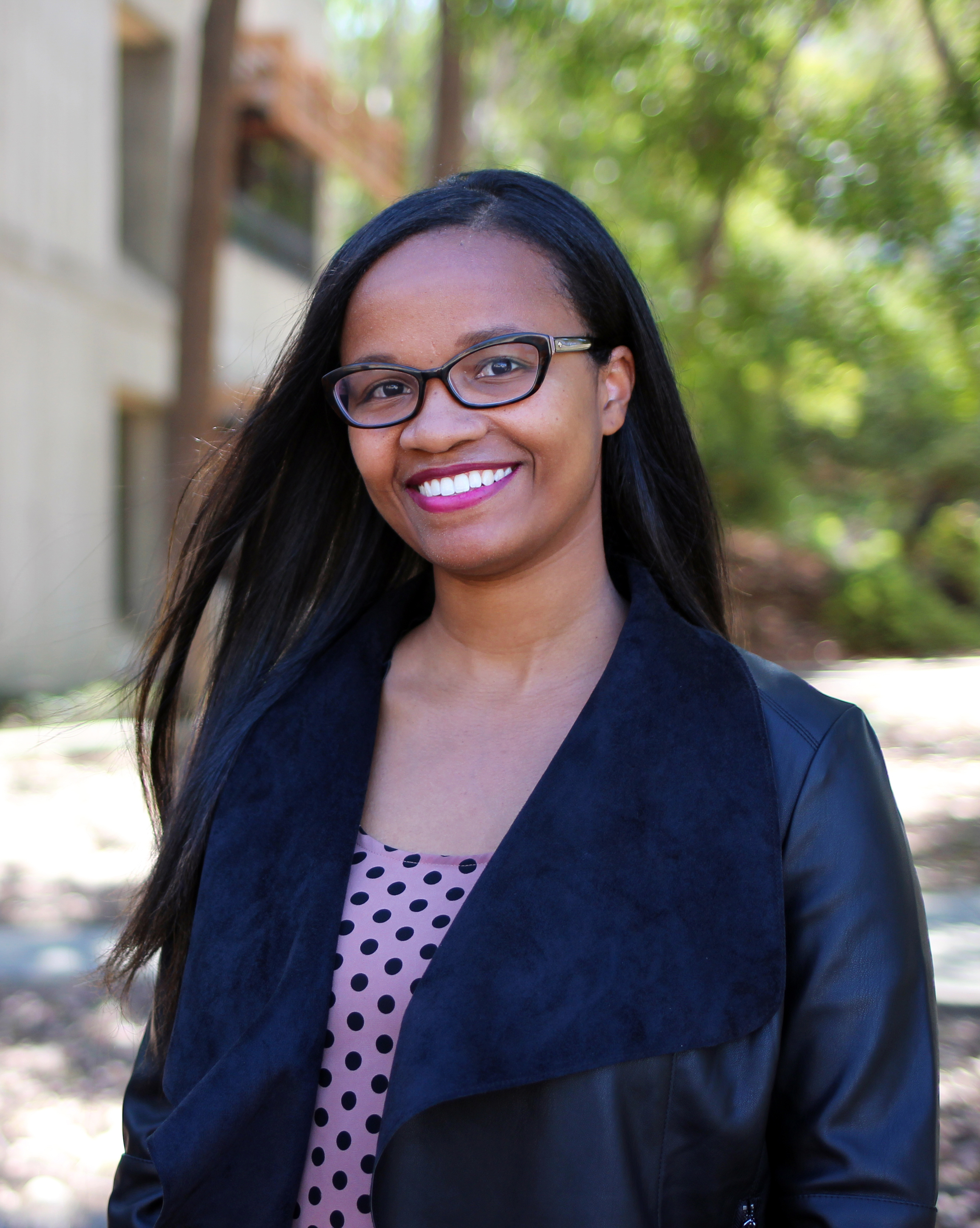
Psychology and child development
Assistant Professor Amber Williams
Mapping Part of the Fair Machine Learning Debate: An Application of a New System for Dialectical Argumentation Diagramming
Philosophy Assistant Professor Ava Wright and
student researcher Benjamin Cornell
Philosophy Assistant Professor Ava Wright and student researcher Benjamin Cornell created a system for mapping debates surrounding the fairness of AI decision-making systems, and then manually mapped a portion of the extensive debate surrounding the topic.
Forest Plantation Transitions in the Peruvian Andes
Eucalyptus plantings flourish at a plantation in Peru.
Social sciences Department Chair Benjamin Timms, Professor Jim Keese, Assistant Professor Andrew Fricker, and student researchers Danielle Gerger and Edson Morales studied the impact of both eucalyptus and pine plantations in the Cuzco region of Peru. Both have been used to replenish forests in the Andes Mountains with differing effects.
Timms said: “Working with the students has given us an extra incentive to invest time and energy into this project. The students are so motivated and excited, it inspires us to make the project a success. They are gaining exposure and experience with advanced topics and going through the peer-reviewed publication process while collaborating across disciplines (one student studies anthropology and geography, while the other studies political science). Given success in the project, they may be able to earn scholarships for study and research in Peru during spring 2022 with one of the professors. Hence, it is a win-win situation for professors and students alike.”
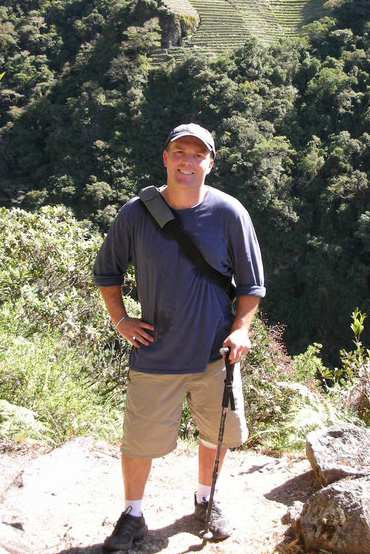

Social Sciences Department Chair Benjamin Timms and
Social Sciences Professor James Keese
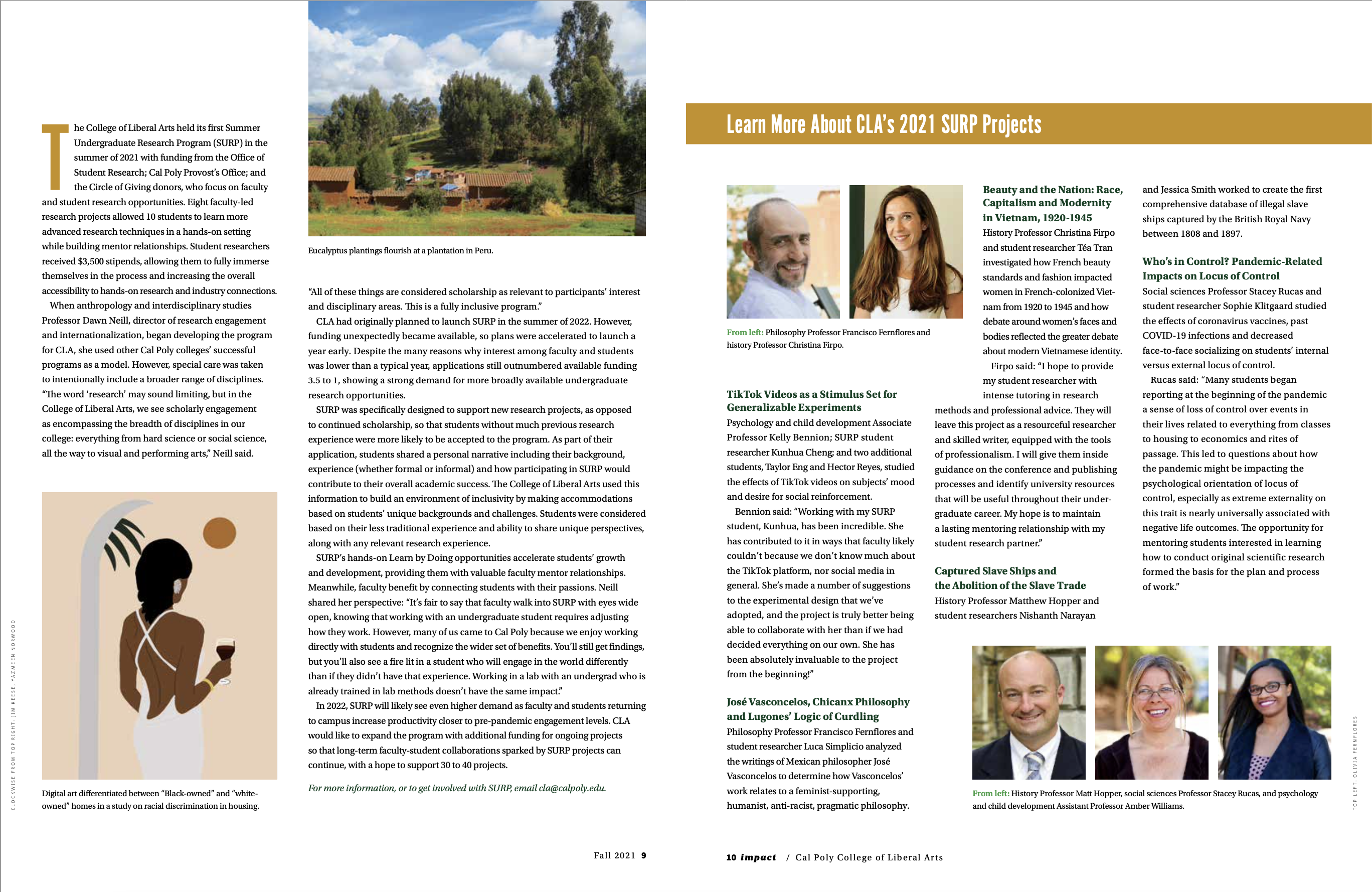 Download a pdf of this article or a pdf of the full IMPACT magazine.
Download a pdf of this article or a pdf of the full IMPACT magazine.

